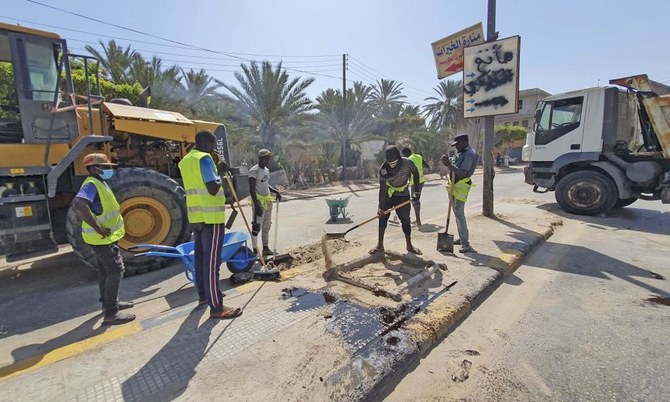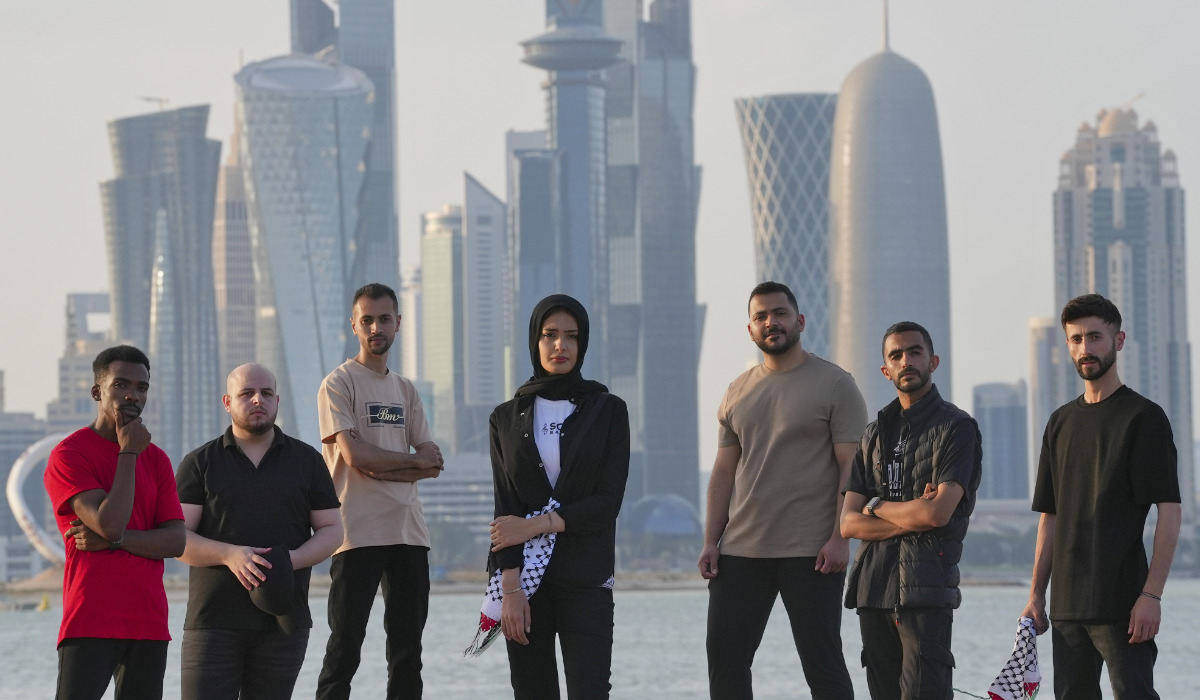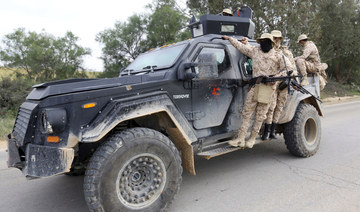MISRATA: As the pandemic started to rage through Libya last month, medics working in the war-ravaged country’s few functioning hospitals faced their nightmare scenario — a surge in cases and dwindling resources.
Hamza Abdulrahman Jelwal, 35, a supervising nurse at a quarantine center in the coastal city of Misrata, has not seen his family since Libya’s lockdown began in March. He has also not been paid.
He tested positive for the coronavirus in August and was quarantined in the same facility. As soon as he got better, he got up and went back to work.
“We work 12 hours a day. It is exhausting for medical staff because there is no rest,” he said.
His experience underscores the high stakes and growing challenges for Libyan medics as the number of confirmed cases spikes. Figures have climbed rapidly from a few hundred last month to almost 20,000 now.
The United Nations’ acting Libya envoy, Stephanie Williams, has told the Security Council that the real number of cases in Libya is almost certainly far higher and that the health system is “unable to respond.”
Libya has been divided since 2014 between the internationally recognized Government of National Accord (GNA) in Tripoli and the west, and areas of the east and south held by Khalifa Haftar’s Libyan National Army (LNA).
The two rival administrations operate parallel governments that have issued differing public health orders aimed at controlling the spread of the virus, but both closed their foreign borders early in the crisis.
Shortfalls and delays
Despite that measure, an outbreak began in July in the southern desert city of Sebha, attributed by some local people to the return of Libyans flown home after being stranded abroad.
The virus then spread into the main urban centers in the coastal cities of Tripoli and Misrata on the GNA side and Benghazi, controlled by Haftar.
The quarantine center where Jelwal works, in the Gharara district, had been a private clinic but was taken over for the crisis by the state-operated Misrata Medical Center.
Administrative issues closed it for most of a month early this summer, he said, contributing to the accelerating number of cases as people could not come in to quarantine.
That was when staff started to quit because they had not been paid, he said. There are few ventilators and little other equipment. State funding, regularly hit by shortfalls and delays, has been particularly disrupted this year because of a blockade on oil exports by the LNA and its allies.
Jelwal was not the only member of staff to fall ill as they tried to cope with the onslaught of new cases.
A colleague, Aisha Milad Belhassna, another nurse at the center also caught the disease.
“Suddenly the air starts to decrease until you reach the point where you feel like you are losing your life,” she said.
Libyan medics already faced war, now the pandemic is surging there too
Libyan medics already faced war, now the pandemic is surging there too

- Figures have climbed rapidly from a few hundred last month to almost 20,000 now
- The United Nations’ acting Libya envoy told the Security Council that the real number of cases in Libya is almost certainly far higher
UN says Gaza death toll still over 35,000 but not all bodies identified

- Haq said those figures were for identified bodies — 7,797 children, 4,959 women, 1,924 elderly, and 10,006 men — adding: “The Ministry of Health says that the documentation process of fully identifying details of the casualties is ongoing”
UNITED NATIONS/GENEVA: The death toll in the Gaza Strip from the Israel-Hamas war is still more than 35,000, but the enclave’s Ministry of Health has updated its breakdown of the fatalities, the United Nations said on Monday after Israel questioned a sudden change in numbers.
UN spokesperson Farhan Haq said the ministry’s figures — cited regularly by the UN its reporting on the seven-month-long conflict — now reflected a breakdown of the 24,686 deaths of “people who have been fully identified.”
“There’s about another 10,000 plus bodies who still have to be fully identified, and so then the details of those — which of those are children, which of those are women — that will be re-established once the full identification process is complete,” Haq told reporters in New York.
Israel last week questioned why the figures for the deaths of women and children has suddenly halved.
Haq said those figures were for identified bodies — 7,797 children, 4,959 women, 1,924 elderly, and 10,006 men — adding: “The Ministry of Health says that the documentation process of fully identifying details of the casualties is ongoing.”
Oren Marmorstein, spokesperson for Israel’s Ministry of Foreign Affairs, on Monday accused Palestinian militants Hamas of manipulating the numbers, saying: “They are not accurate and they do not reflect the reality on the ground.”
“The parroting of Hamas’ propaganda messages without the use of any verification process has proven time and again to be methodologically flawed and unprofessional,” he said in a social media post.
Haq said UN teams in Gaza were not able to independently verify the Gaza Ministry of Health (MoH) figures given the ongoing war and sheer number of fatalities.
“Unfortunately we have the sad experience of coordinating with the Ministry of Health on casualty figures every few years for large mass casualty incidents in Gaza, and in past times their figures have proven to be generally accurate,” Haq said.
The World Health Organization “has a long-standing cooperation with the MoH in Gaza and we can attest that MoH has good capacity in data collection/analysis and its previous reporting has been considered credible,” said WHO spokesperson Margaret Harris.
“Real numbers could be even higher,” she said.
Libya customs officers arrested over huge gold shipment

- The country is split between Abdelhamid Dbeibah’s UN-recognized government in Tripoli and a rival administration in the east, backed by strongman Khalifa Haftar
TRIPOLI: Libyan authorities have arrested several customs officials for attempting to traffic abroad about 26 tons of gold worth almost 1.8 billion euros ($1.9 billion), prosecutors said.
The Libyan prosecutor’s office did not detail the suspected origin of the massive amount of precious metal, greater than the national gold reserves of many countries.
Authorities in Misrata, western Libya, made the arrests related to the trafficking operation at the port city’s international airport, the office said Sunday night.
“The investigating authorities ordered the arrest of the director general of customs and customs officials at the international airport of Misrata,” it said in a statement released on Facebook.
The officials had attempted in December 2023 to traffic the gold bars weighing some 25,875 kilograms, currently worth almost 1.8 billion euros, the statement said.
Libyan law says only the central bank can export gold, said the office, which opened an investigation into the case in January.
Libya has been plagued by political instability and violence since the 2011 overthrow and killing of longtime dictator Muammar Qaddafi.
The country is split between Abdelhamid Dbeibah’s UN-recognized government in Tripoli and a rival administration in the east, backed by strongman Khalifa Haftar.
Misrata, east of the capital Tripoli, played a key role in fighting Qaddafi’s forces, as well as against the Daesh group’s fighters in 2016, and in battling against a failed offensive by Haftar’s forces against the capital Tripoli in 2019.
The US-based non-government group The Sentry, which investigates trafficking in conflict areas, said that chaos-torn Libya has become a key hub for illicit gold trafficking over the past decade.
“Particularly since 2014, Libya has been used as a transit area toward places such as the UAE and, to a lesser extent, Turkiye” for trafficking gold, according to report the group published last November.
“Two crucial points of transit are used to export gold on an illicit basis: the port and airports of the Misrata-Zliten-Khums area and those of Benghazi” in the east, the report said.
Five Iraqi soldiers killed in Daesh attack, sources say

- Iraq’s defense ministry issued a statement mourning the loss of Col. Khaled Nagi Wassak “along with a number of heroic fighters of the regiment as a result of their response to a terrorist attack”
BAGHDAD: An Iraqi commanding officer and four soldiers were killed and five others injured on Monday in an attack by suspected Daesh militants on an army post in eastern Iraq, two security sources said.
The attack took place between Diyala and Salahuddin provinces, a rural area that remains a hotbed of activity for militant cells years after Iraq declared final victory over the extremist group in 2017.
Iraq’s defense ministry issued a statement mourning the loss of a colonel and “a number of heroic fighters of the regiment as a result of their response to a terrorist attack.”
Security forces repelled the attack but there were many casualties in the process, the statement added.
Iraq has seen relative security stability in recent years after the chaos of the 2003-US-led invasion and years of bloody sectarian conflict that followed.
Baghdad is now looking to draw down the U.S-led international coalition that helped defeat Islamic State and remain in the country in an advisory role, saying local security forces can handle the threat themselves.
Palestinian band escapes horrors of war but members’ futures remain uncertain

- Israel has killed more than 35,000 people and leveled large swaths of Gaza
- The band — which formed in 2012 and plays both traditional Arabic songs and their own modern pop songs — has long served as a refuge for its members who grew up in Gaza amid grinding poverty and other hardships
DOHA, Qatar: They stroll Doha’s waterfront promenade and sing softly about children who are now “birds in heaven,” flying free of the pain of the war in Gaza.
For the Palestinian group Sol Band, it seems surreal that weeks ago they were hiding from Israeli shelling.
“I just want the war to end,” said Rahaf Shamaly, the band’s main vocalist and only woman. “I want to return to Gaza, walk and clean up its streets, hug my family, and sing with the band in the place where we started from.”

Five of the band’s seven musicians returned to Gaza in August to work on their next album.
“We had a lot of music and performances planned,” said Fares Anbar, the band’s percussionist.
But on Oct. 7, Hamas, along with other militants, attacked southern Israel, killing 1,200 people and taking 250 others hostage. Israel retaliated with a military campaign that has so far killed more than 35,000 people and leveled large swaths of Gaza.
In April, the five bandmates were able to leave Gaza via Egypt to Qatar.
The band — which formed in 2012 and plays both traditional Arabic songs and their own modern pop songs — has long served as a refuge for its members who grew up in Gaza amid grinding poverty and other hardships. Their home, a 360-square-kilometer (140-square-mile) enclave, has been blockaded for years by Egypt and Israel. Its population of 2.3 million Palestinians has suffered through previous rounds of war between Israel and Hamas, which has ruled the strip since 2007.
“Living under a siege, an occupation, and living through very difficult circumstances … music was my only escape since I was a child,” the band’s founder and percussionist, Said Fadel, said.
Music shaped Fadel’s life. His grandfather was one of the first percussionists in the area and his grandmother played the oud, a lute-like stringed musical instrument common in the Middle East and Africa.
Of Sol Band’s songs, “Raweq Wa Haddy,” or “Chill Down,” is their most famous. The lyrics that promise “great days coming back,” now seem a lifetime away for people who are moving from place to place, hiding from airstrikes.
After returning to Gaza in August to record, the five members of the band filmed themselves surviving the attacks and shared the videos online whenever an Internet connection allowed. Music remained their lifeline and their main hope; they created songs, often amid the rubble, with sounds of explosions in the background. They filmed music videos from where they sheltered, urging people not to lose hope and remain resilient in the face of adversity.
Some songs touched on those killed by Israeli airstrikes, particularly children.
“My children are birds in heaven, lucky is heaven to have them,” one song goes. “All my life I hoped to raise them and see them grow up before my eyes.”
In shelters and camps across Gaza, Sol Band’s five members held activities for displaced children to keep their minds off what was happening. Anbar, the band’s percussionist, even taught some how to keep a beat as a drummer.
They posted videos of themselves in tents, playing the guitar and drums, with smiling children who sang along.
“The children’s interaction with the music, and how they forgot everything that is happening around them … it proved to me the importance of music in our lives and the effect it has in the Gaza Strip,” he said.
The five band members who left Gaza via Egypt to Qatar had been scheduled to perform on the first stop of their tour “The Journey Begins” at a Palestinian culture festival in Doha. Though the band has achieved fame internationally, like other Palestinians they hold travel documents that often involve complicated requirements, and at times they face outright visa rejections.
“Our passports are Palestinian, (and our) birthplace Gaza,” Anbar said. “This made it very difficult for us to get visas.”
With pending shows in Belgium and Tunisia, there is little guarantee that they will make it there. And if their visa situation is not sorted out in Qatar, the five will eventually have to return to Gaza — and an uncertain future.
“Would the plans we had before the war still happen?” asked Hamada Nasrallah, a vocalist. “We have no clear answers.”
UAE president presents Indonesia’s defense minister with Order of Zayed

- Subianto receives UAE’s highest civil honor in recognition of his contribution to improved bilateral cooperation
DUBAI: UAE President Sheikh Mohammed bin Zayed Al-Nahyan on Monday presented Indonesia’s defense minister, Prabowo Subianto, with the Order of Zayed, the UAE’s highest civil honor, in recognition of his contribution to the enhancement of cooperation between the countries.
During the meeting in Abu Dhabi, Subianto conveyed greetings from Indonesia’s President Joko Widodo and expressed his desire for the continued advancement and prosperity of the UAE, the Emirates News Agency reported. Sheikh Mohammed responded with similar wishes for Indonesia.
The president and defense minister also discussed the relationship between their countries, particularly as it relates to defense and military affairs, and ways in which it might be enhanced in the interests of both countries, and reviewed regional and international issues of mutual interest.
Sheikh Mohammed said he was keen to leverage the strong strategic ties between the UAE and Indonesia to deepen cooperation so that both nations benefit from shared opportunities for development and prosperity.




















